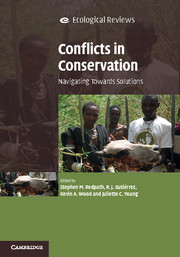Book contents
- Frontmatter
- Dedication
- Contents
- List of contributors
- Foreword by Georgina Mace
- Acknowledgements
- Part I Introduction to conservation and conflict
- PART II Contrasting disciplinary approaches to the study of conflict in conservation
- 3 The value of ecological information in conservation conflict
- 4 Environmental history and conservation conflicts
- 5 The political ecology of conservation conflicts
- 6 Understanding conservation conflicts: an economic perspective
- 7 Anthropological approaches to conservation conflicts
- 8 Law and conservation conflicts
- 9 The relevance of psychology to conservation conflicts
- 10 Conservation conflicts: ethical issues
- 11 A view from sociology: environmental movement mobilisation over old-growth temperate rainforests in British Columbia
- 12 Peace research and conservation conflicts
- 13 Linking conflict and global biodiversity conservation policies
- Part III Approaches to managing conflicts
- Index
- Plate Section
- References
4 - Environmental history and conservation conflicts
from PART II - Contrasting disciplinary approaches to the study of conflict in conservation
Published online by Cambridge University Press: 05 May 2015
- Frontmatter
- Dedication
- Contents
- List of contributors
- Foreword by Georgina Mace
- Acknowledgements
- Part I Introduction to conservation and conflict
- PART II Contrasting disciplinary approaches to the study of conflict in conservation
- 3 The value of ecological information in conservation conflict
- 4 Environmental history and conservation conflicts
- 5 The political ecology of conservation conflicts
- 6 Understanding conservation conflicts: an economic perspective
- 7 Anthropological approaches to conservation conflicts
- 8 Law and conservation conflicts
- 9 The relevance of psychology to conservation conflicts
- 10 Conservation conflicts: ethical issues
- 11 A view from sociology: environmental movement mobilisation over old-growth temperate rainforests in British Columbia
- 12 Peace research and conservation conflicts
- 13 Linking conflict and global biodiversity conservation policies
- Part III Approaches to managing conflicts
- Index
- Plate Section
- References
Summary
In the mid-1990s in Scotland, two historians chaired the board of the government's statutory body for nature conservation, Scottish Natural Heritage (SNH). Television broadcaster, journalist and expert on the Icelandic sagas and Viking history, Magnus Magnusson KBE, was its first Chairman from 1992; and socioeconomic historian and Historiographer Royal, T. C. Smout CBE, was Deputy-Chairman from 1992 to 1997. This choice of senior management has remained something unique, quirky perhaps and yet visionary – two ‘historians of people’ presiding over what might rightly be perceived by many to be a purely scientific organisation concerned only with the biological management of the natural world. However, both men were firmly of the vision that people were a part of nature and found a home pioneering the emerging discipline of environmental history in Scotland. Smout reflected on those exciting days on boards and committees where he learned, ‘how deep and complex were the issues surrounding nature conservation, and how little it was appreciated that they were matters of history as well as of contemporary manoeuvring and posturing round vested interest’ (Smout, 2009: 1). Here was an evolving recognition and acceptance within a nature conservation policy-making world that human attitudes, values and perceptions (the socio-cultural) shaped behaviour and responses to the natural world, and that those same attitudes were both complex and had evolved over time in response to different stimuli.
Smout (2000: 2) outlined in Nature Contested how all conservation conflicts had a history, often ignored or forgotten in the heat of the moment: ‘I was struck by the passions unleashed by the difficult cases that came before us – here was hotly contested ground – and by the essentially historical nature of many of the problems. If a wood needed saving, it was because it had a history in which human beings had once played a central part, and because today other human beings (with their own histories as foresters) wished to play a different part.
- Type
- Chapter
- Information
- Conflicts in ConservationNavigating Towards Solutions, pp. 49 - 63Publisher: Cambridge University PressPrint publication year: 2015
References
- 3
- Cited by

